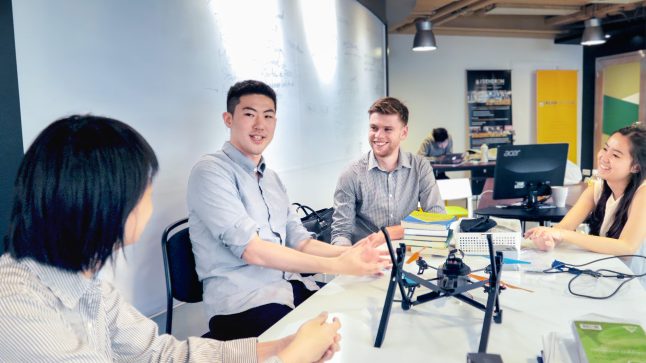
Dr. Fred Ganotice, Jr. serves as the program coordinator of Interprofessional education of the Bau Institute of Medical and Health Sciences Education. Through his TDG-supported project called “Finetuning the application exercise and facilitation strategies of interprofessional education”, he works to improve further the IPE model currently being implemented.
Interprofessional Education (IPE) aims to break educational silos by putting students from diverse backgrounds to be better collaborators by learning with, from, and about each other, thus managing power hierarchies in the workplace. Teamwork and collaboration are important learning competencies to help prepare future health professionals reshape both the process (e.g., from silos to interprofessional team-based care) of health care management and health outcomes. IPE becomes a means within which future healthcare professionals become collaborative practice ready.
This year, IPE has been scaled-up to include both face-to-face IPE and “online asynchronous and synchronous IPE” and are participated in by five disciplines: Chinese Medicine, Medicine, Nursing, Pharmacy, and Social Work. The outbreak of coronavirus disease has prompted the inclusion of online IPE which helps mitigate the potential health risks of large student gatherings. Three of the four IPE lessons have been transformed into online IPE.
| IPE Lesson | Mode | Duration | Student Participants |
|---|---|---|---|
| 1. Anticoagulation therapy | Face-to-face | January 19, 2020 | MBBS – 116 Nursing – 123 Pharmacy – 30 Total 269 |
| 2. Multiple drugs and complementary therapies | Online | Feb 10 – 22, 2020 | MBBS – 114 Nursing – 84 Pharmacy – 30 Chinese Med – 9 Total 237 |
| 3. Depression | Online | March 2 – 14, 2020 | MBBS – 116 Nursing – 93 Chinese Med -24 Social Work – 22 Total 255 |
| 4. Cancer | Online | March 16 – 28, 2020 | MBBS – 114 Nursing – 93 Chinese Med -15 Social Work – 22 Total 274 |
The online IPE is built around asynchronous self-paced interprofessional team-based activities, online discussion teams, and healthcare planning exercises to develop teamwork skills among students. The content experts go live for an online synchronous interactive discussion while students participate via Zoom in the convenience of their homes.
 Dr George L. Tipoe, BIMHSE Director, facilitates interteam discussion in IPE Anticoagulation Therapy
Dr George L. Tipoe, BIMHSE Director, facilitates interteam discussion in IPE Anticoagulation Therapy
 The teachers involved in IPE Multiple drugs and complementary therapies process the IPE team activities
The teachers involved in IPE Multiple drugs and complementary therapies process the IPE team activities
 The sequence of activities for Online synchronous and asynchronous IPE.
The sequence of activities for Online synchronous and asynchronous IPE.

 Sample of discussion board entries of a team in readiness assurance test (tRAT)
Sample of discussion board entries of a team in readiness assurance test (tRAT)
To promote teamwork and collaboration among teams, they are instructed to represent the knowledge of their discipline in the discussion of multiple-choice questions as a team. We used the within team differences in perspectives to push them to discuss more and be respectful to other disciplines.
An important part of Online IPE is the formulation of interprofessional care plans, which provides students from four to five disciplines the chance to integrate their collective intelligence and expertise in the management of patients.
 Sample team care plan developed based on a clinical case (asynchronous team activity)
Sample team care plan developed based on a clinical case (asynchronous team activity)
This year, infographics on guidelines in facilitating interteam discussion is made available to the teachers to help them be more equipped in developing amongst teams desirable teamwork skills e.g., collaborative decision making and problem solving, teamwork and collaboration, communication (ability to listen and express), negotiation, respect for the opinion of other disciplines (e.g., accommodate/reconcile differences in perspectives), and social skills (e.g., being comfortable in team).
 Guidelines to facilitate IPE interteam discussion (developed through the help of CETL and TELi)
Guidelines to facilitate IPE interteam discussion (developed through the help of CETL and TELi)
Initial evaluation data provide sources of reflection for the program implementers. For example, the following realization from a student is a good point for reflection: “I used to think that doctors always play the most significant role in healthcare. I realized that it’s not – as they also need the support of other disciplines and it’s critical to form an interprofessional team in order to provide quality care for the patients. In the future I plan to exchange idea and collaborate with peers from different disciplines” (lifted verbatim).
If you want to learn more about online IPE, please contact Dr. George L. Tipoe (tgeorge@hku.hk) or Dr. Fred A. Ganotice, Jr., (ganotc75@hku.hk) at Li Ka Shing Faculty of Medicine, Bau Institute of Health Sciences Education. If you want to know the technical aspects of running large classes, you may contact the Technology-Enriched Learning Initiative (TELI) via enquiry@teli.hku.hk.








